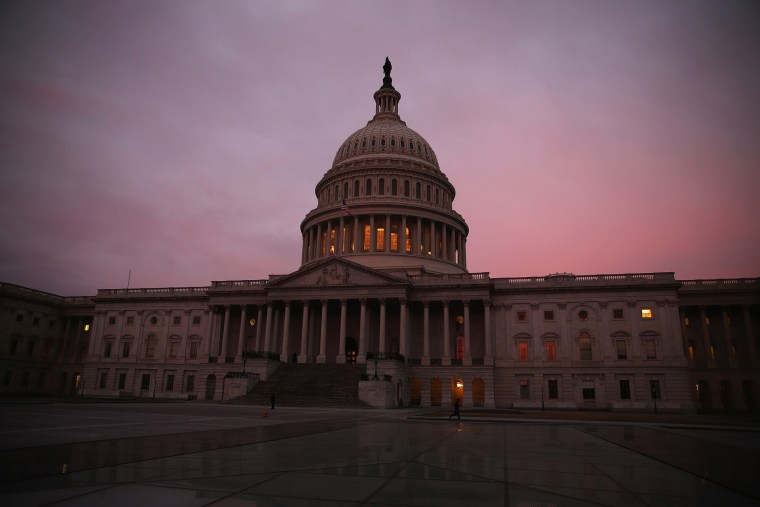As of 8:30 p.m. (ET) last night, with three-and-a-half hours remaining until a government shutdown, no one seemed to have any idea what the Republican-led House would do -- or if it would even do anything.
But after a furious round of behind-the-scenes lobbying, the so-called "CRomnibus" spending package reached the floor, and as Suzy Khimm and Benjy Sarlin reported, it narrowly passed.
With just hours before government funding was scheduled to expire, the House voted 219-206 to pass a $1.1 trillion spending bill, fending off a last-minute revolt from liberal Democrats over provisions to roll back regulations on Wall Street and campaign finance. [...] The bill now moves to the Senate, which, according to Sen. Harry Reid, will begin consideration of the measure Friday.
The full roll call on last night's vote is online here. Note that 67 House Republican broke ranks and opposed the package negotiated and endorsed by their own chamber's leaders -- that's a little more than a fourth of the caucus -- which would have been enough to kill the legislation were it not for the 57 House Democrats who rebuffed their leaders and backed the bill.
Procedurally, the House also approved a two-day extension of current funding, which was also quickly endorsed by the Senate, which prevented a shutdown and gave the upper chamber a couple of extra days to complete work on the $1.1 trillion spending package.
In terms of what to expect, the Senate is likely to take up the bill today, though opponents -- on the left or right -- could force a delay until the weekend. The package enjoys the support of the leadership in both parties and will probably pass. Note, House members have already left town, so if senators try to change the bill in any way, they'll effectively kill the package.
Though the schedule is still coming together, senators are also going to tackle the Defense spending bill (NDAA), the Terrorism Risk Insurance Act (TRIA), several "tax entenders," and some pending nominations before wrapping up for the year.
As for the larger context, I can appreciate why much of the political world was breathing a sigh of relief last night -- government shutdowns should always be avoided -- but these are not circumstances to celebrate.
Democrats and Republicans had an agreement in place on how much money to spend for the rest of the fiscal year, which, in theory, should have made it incredibly easy to avoid a shutdown.
What we saw instead was weeks of unnecessary drama and uncertainty, followed by ugly arm-twisting and a chamber that barely avoided a shutdown deadline.
As we talked about the other day, congressional dysfunction has reached a level in which we're relieved and pleasantly surprised when lawmakers stumble onto a dubious solution that keeps the government's lights on for nine months. What was once the most routine of legislative tasks is now a Sisyphean challenge.
What we saw last night wasn't evidence of a legislative branch finding a way to make the system work, but rather, evidence of a body that struggles mightily to do its job. If House members left for the airport last night feeling a sense of pride and accomplishment, they badly missed the point.
We need to set the bar for success higher. We need to raise our expectations about what should be possible in the legislative branch of a 21st-century global superpower.
